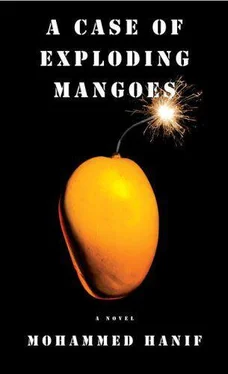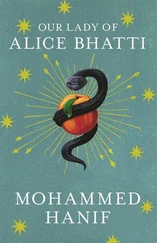Ifollow the chicken korma smell and crawl my way towards the door. I pick up the plate and put it back. It’s hot. I suddenly feel very hungry. I sit down with my back against the door and start to eat. My world is reduced to the tender chicken flesh dripping with creamy curry. Even the bitter whole spices that get stuck in my teeth seem like portents of a prosperous, free future. I have only finished half my plate when the brick is pushed out. I take my plate to the hole and remove the brick.
“I wanted to check they have given you food because sometimes they like to starve the newcomers. You can share mine. Lentil soup garnished with gravel and fifty-fifty bread that is half flour and half sand. Your military chefs are very consistent. I have received the same food for nine years.”
I feel the guilt that the privileged prisoners must feel. I put my plate aside. “No. They have given me food.”
We sit in silence for a while. The absence of any prospects of freedom in the near future hangs heavy in the air. Suddenly this plate of rich, hot food seems like the promise of a long sentence. I feel the walls of this dungeon closing in on me.
“Did your strike work then?” I am desperate for conversation about anything that is not the quality of food or the texture of darkness in this part of the Fort.
“The idea was that people faced with so much uncollected garbage would rise up in solidarity with us. But nobody even noticed. Our people get used to everything. Even the stench of their own garbage.”
“I am sure someone must have noticed. Otherwise you wouldn’t be here.”
“Oh yes, you people noticed. After some intelligence analyst realised that mullahs couldn’t infiltrate our ranks, they started cultivating our own Maoist faction.” His whisper suddenly gets animated. “I wouldn’t say it in public but Maoists really are worse than mullahs.”
I don’t know why he is going on about Maoists, but I know he wants a reaction to his confession. But the only Mao I know is that Chinese guy with the cap and I have no clue what his people are doing in Pakistan, let alone in the sweepers’ union.
“That is probably true,” I say thoughtfully. “China has produced nothing worthwhile since Sun Tzu. Even the fighter jets they give us are flying coffins.”
Secretary General is clearly not interested in the quality of his motherland’s air defences.
“I proved to them, with an empirical analysis of our so-called peasants’ movement, that our modes of production are determined by the petty bourgeoisie and not what they call feudal landlords, but these Maoists are very dogmatic. In Pakistan, you cannot have a peasants’ revolution. Don’t you agree?” He is begging me to agree.
“Yes,” I say. “Of course. Pakistani peasants are happy, no one goes hungry here.”
“Is that what they teach you in the army? That our peasants are well fed and every night before going to sleep they dance their joyous dance around their bountiful crops. You people live on another planet. This is even worse than the Maoist propaganda.”
“They don’t teach us anything like that,” I say, and it’s true. “Just because I wear a uniform, you think that I don’t know anything about our people. I am from this country, I am also a son of the soil. I come from a peasant family.” That may not be accurate, but we did have an orchard in our backyard on Shigri Hill.
“Don’t use your pseudo-feudal jargon with me. That is precisely the problem with our peasants. Maoists think that we live in an agrarian society. But look at our modes of production, look at the land ownership patterns. We live in a pre-agrarian, pre-feudal era. And these Maoists talk of a peasant revolution. It’s the worst kind of bourgeois romanticism.”
I think about the interrogators who have had to deal with him. He probably taught them a thing or two. Secretary General is not finished with me yet. “Have you seen a single peasant in this prison?”
“You are the only person I have met,” I say.
He is silent for a moment, probably suddenly realising that I am very new to this place, and that he doesn’t know all that much about me. But his urge to conclude his argument overcomes the awkwardness of our exchange and he continues.
“There aren’t any. Not real peasants. Not revolutionary peasants. The ones I have met are fighting for their feudal lords, not against them. They are fighting to preserve the status quo. They are fighting so that their feudal lords can keep them in their shackles. They are subverting the genuine class struggle of workers like me and you.”
I am relieved. I am finally in the fold. I am a worker and my struggle is genuine.
“According to our party manifesto, there is no difference between a sweeper and a soldier,” he says, I think just to underline the rules of our engagement. “These are both forms of exploitative labour that the military-industrial complex thrives on.”
I have no problems being called a worker in a generic sense but I don’t think I would make a very good sweeper.
“Were you a sweeper?” I ask him. “I mean before becoming the Secretary General.”
“No,” he says, in an irritated voice. “I was a mango farmer before I started organising the sweepers.”
“Secretary General, can I raise a point of dissent here? I suspect you oppose a peasants’ revolution because you fear that first of all they’ll take over your mango orchards,” I say in a triumphant tone, as if we were not in an underground prison but at a meeting of his central executive committee. I sigh deeply and imagine smoke-filled rooms, littered with overflowing ashtrays.
Secretary General is silent for a moment, then he clears his throat and speaks in an apologetic voice. “I was a Maoist myself. I organised the mango orchard owners all over the country. I was the founding chairman. Within a year we had formed strategic alliances with mango farmers in India and Mexico. But our members were bourgeois at heart, every single one of them a class enemy. They would attend our study circles during the day and then go and throw mango parties for your generals at night. If only they had understood, we would have become the largest farmers’ collective in the entire capitalist world. Imagine the blow to the capitalist economy.”
“Secretary General,” I address him formally, “can I put another point of dissent on record? Do you really think you can bring the capitalist economy down by fixing mango prices?”
There is silence at the other end. I close my eyes and when I open them again the darkness seems tinged with fluorescent circles dancing in the dead air.
“I realised that. That’s why I declassed myself and started organising the sweepers. But your army people are scared of even the poorest of the poor who clean your gutters.” At this he replaces the brick in the wall.
On the floor, face down, my left cheek on the cool sand, arms stretched out, palms upward, I am trying to clear my head of sweepers and Maoists and peasants and fluorescent circles. Secretary General seems too well read to have plotted anything, let alone a plan involving a bomb in a gutter. Will he believe me if I tell him about my plan? We can probably compare notes. We can probably learn from each other’s failure, share tips about our interrogators. There is complete silence from his side. I guess it’s my turn to make a peace move.
I take the leftover food and push the brick towards him. “I have got some chicken here if you’d like it,” I whisper.
I can hear him sniff the plate. His hand enters the hole and he shoves the plate towards me, spilling the curry over my shirt. “I don’t eat collaborators’ leftovers.” The brick is shoved in with a sense of finality.
Читать дальше












